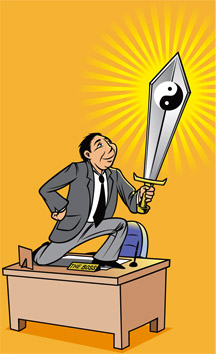
|
Conflict
How to avoid the sharp edges
and still get your point across
![]()

Conflict presents a comparable test. We are all familiar with one edge of the sword of conflict. Sweaty palms and racing hearts serve as a constant reminder. If we lack the sensitivity and skills needed to stay on the edge to manage conflicts, well, blood, in some form, may be shed -- from resentments or broken relationships.
On the other edge of the blade of conflict lies the creativity; the unexplored, unconsidered and typically highly divergent ideas essential to those in search of organizational excellence. As Simon London put it in Financial Times, "Major disagreements among corporate executives can be a waste of time and money and cause damage to working relationships, but they also can be a healthy way of sharing (and creating) new ideas if managed effectively." Several things will help a management team have healthy conflict.
While the normal emotions stirred in any significant difference of opinion are highly personal, it is vital that in the heat of the moment, there be no personal attributions. "You're being as stubborn as a mule!" will only serve to fan the flames of defensiveness. "Can you summarize what parts, if any, of what I've said that you agree with?" will be potentially more productive for several reasons.
First off, it serves to facilitate more active listening to counteract the normal tendency in the heat of battle to selectively focus on differences vs. similarities. Second, if any similarities in positions can be identified, the potential for discovering a common alternative will exist. And the identification of common goals is key to conflict resolution. Third, taken together, these two factors also can increase the number of options on the table. Debates centered on only one or two options are considerably more likely to turn into hardened positions.
Humor is also a potential tool. I underscore the word potential, however, to remind us that humor can also be a two-edged sword. It can lighten the mood for everyone, as well as cut someone off at the knees. Humor must be employed with sensitivity and integrity. Its intention must be sincerely positive -- to oil a point of friction -- vs. being used as a masked form of hostility.
Perhaps the most difficult obstacle in the way of a "good fight" has to do with how the team, and its leader, handle to issue of positional power. Heavy-handed leaders are able to create the illusion of collaborative conflict resolution. All of the important differences get buried under a false consensus around a decision that, in reality, reflects the boss's preference. Laissez-faire leaders do no better. The leadership vacuum they create only exacerbates conflict.
The ideal is one of balance. The leader and the team members have the boss be part of the group, vs. apart from the group, while not denying his or her power position.
But, of course, teams and leaders who have learned how to balance this reality day-in and day-out have already developed the kind of healthy team culture that enables them to have good fights when they are called for.
Irrevocable trusts
need not be scary
Irrevocable trusts are used frequently in estate planning for a wide variety of purposes. They can be used to make a gift of assets, while restricting access to the assets or retaining indirect control. Irrevocable trusts can be used to help protect assets from creditors of trust beneficiaries. Such trusts even can be used as part of planning to qualify for Medicaid benefits.
The most typical irrevocable trust is the irrevocable life insurance trust, or ILIT. This is an irrevocable trust designed to hold life insurance on the life of the person setting up the trust, the "grantor." By contributing life insurance to this trust, the insurance can be kept from being taxed in the insured grantor's estate at his or her death.
While irrevocable trusts have unique advantages, they have one significant disadvantage: they cannot be revoked or changed by the grantor. However, irrevocable trusts can be drafted so that a disinterested party, the "special co-trustee" or "trust protector," can make limited changes. For example, if the trust was set up for your two children, Mary and Johnny, it may make sense to modify their interests depending upon their changing circumstances. A good example of this would be if Johnny won the lottery. In that instance, the parents may want someone to be able to carve back Johnny's inheritance in favor of Mary's share.
Sometimes it may be beneficial to start over with a new trust. The problem is that the grantor may not be insurable anymore. Further, if a policy is gifted to the trust, there is a three-year waiting period for it to be out of the estate.
Irrevocable trusts often seem daunting. However, an estate planning attorney can assist in determining whether an irrevocable trust is consistent with your goals.
[News] [Business] [Features] [Sports] [Editorial] [Do It Electric!]
[Classified Ads] [Search] [Subscribe] [Info] [Letter to Editor]
[Feedback]
